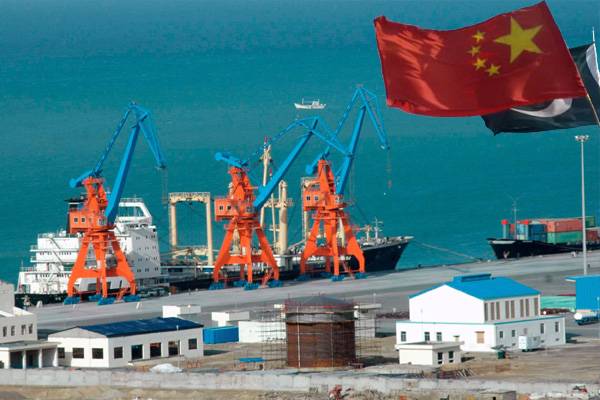Pakistan Navy all geared up to strengthen maritime security of CPEC: Beijing Review
Shares

BEIJING (China) (APP): China and Pakistan are working together to implement the China-Pakistan Economic Corridor (CPEC) programme at full speed, which provides further impetus for the two nations to extend their cooperation from land to sea.
CPEC will become a 3,000-km-long route connecting Kashgar in northwest China's Xinjiang Uygur Autonomous Region to Gwadar Port in Pakistan's Balochistan province.
Along the route, the two countries are building a network of extensive roads, railways, ports and other infrastructure.
According to "Beijing Review", with Gwadar port a new option, China's cargo trade routes to the Middle East, Africa and Europe will receive a further boost.
The busy shipping course through the Malacca Strait will no longer be the sole passage for Chinese cargo ships bound for these regions.
The deep-sea Gwadar Port is adjacent to the key oil routes in and out of the Gulf.
It is also the nearest warm-water seaport to the landlocked Central Asian countries rich in oil and gas resources.
The CPEC, through making Gwadar Port a new trade hub, will bring China and Pakistan new opportunities for economic and trade growth.
In recent months, Pakistan has taken a number of measures to enhance maritime governance through cooperation with China and other countries.
In mid-February, Pakistan held a multinational naval exercise in Karachi and waters of the North Arabian Sea. Military vessels, aircraft and special marine force teams from 37 countries joined the five-day exercise.
This year's drill was also a display of united resolve against terrorism and crime in the maritime domain.
Pakistan Navy established a new unit, composed of warships, helicopters and unmanned aerial vehicles supported by shore-based sensors to ensure the security of Gwadar Port and CPEC.
"The CPEC projects on land have been under the protection of the Pakistani Army. As for maritime challenges, it is the job of the Pakistan Navy to protect Gwadar Port," Vice Admiral Syed Arifullah Hussaini, Pakistani Fleet Commander Hussaini told Beijing Review.
Wang Dakui, a senior researcher at the National Marine Environmental Forecasting Center of the State Oceanic Administration of China recently visited Gwadar Port.
In his opinion, Gwadar enjoys a promising future as a new trade harbor of the Arabian Sea, but measures and infrastructure to prevent oceanic disasters need upgrading.
"In addition to infrastructure projects, China is working with Pakistan to improve its research and technology within the maritime science and environment sector," Wang told Beijing Review.
According to him, since it was established in 2003, China's marine hazard early warning system has served well in forecasting oceanic weather and preventing many losses from natural disasters, including storms, typhoons and tsunamis.
Pakistan Ambassador to China, Masood Khalid expects bilateral relations to consolidate further as more cooperation in CPEC is implemented.
"We hope the progress of CPEC projects will gain more, and the link between the two countries will grow stronger this year," he told Beijing Review.
So far, the two governments have held six annual meetings on propelling CPEC projects. The regular meeting mechanism works well to promote the communication on infrastructure, energy and port projects, according to Khalid.
Through increasing inte-rconnectivity between China and Pakistan, more people-to-people exchanges can be promoted in future.
